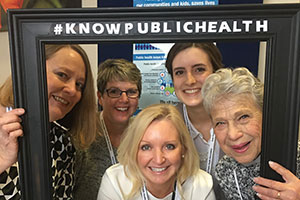Educators
The State Hygienic Laboratory collaborates with educators to train the current workforce and also to inspire the next generation of environmental and public health laboratory scientists.
Activities and Lessons
Hands-on, career-oriented lessons support educators in teaching students about public health laboratory science in a way that is relevant and engaging.
Lesson materials related to many topics in environmental and public health include:
-
Field of Streams
Introduce students to careers in limnology through a water quality lesson.
-
Color Chromatography
Teach students about environmental testing using a chromatography activity.
-
Disease Detectives: Zombie Outbreak
Engage students in an outbreak investigation to learn about epidemiology.
-
Emergency Response Simulation
Teach students how the emergency response process works by testing plans, making decisions and facing unexpected events.
-
Did You See That? Board Game
Introduce students to public health laboratories and careers using a board game combined with video clips.
-
“That’s Sick!”
Find links to a variety of public health lesson plans, including lessons about influenza, genetics, preparedness, environmental monitoring, antimicrobial resistance, vaccinations and food safety.
Questions? Email Laina Edwards, SHL Training Supervisor.
Teacher Externships
The State Hygienic Laboratory hosts teachers who spend part of their summer working with SHL lab staff on environmental and public health projects. These teacher “externs” work as part of the SHL to experience the real-world applications related to the STEM subjects they teach.
The goal of the externship program is to provide teachers the tools and experiences that they may share with students in the classroom.
STEM Teacher Externships are coordinated by the Iowa Governor’s STEM Advisory Council. For more information about programming, eligibility and applications, visit the STEM Advisory Council website.
Resources
- Keeping Iowans Healthy: State Hygienic Laboratory at the University of Iowa: A glimpse of the way SHL helps ensure the good health of Iowans, national partners and babies born in Iowa, North Dakota, South Dakota and Alaska.
- Your Future in Laboratory Science: A brochure about opportunities for students at the State Hygienic Laboratory.
- Pathways to Adventure: A guide to careers in laboratory science.
- Did You See That?: A board game to learn about public health laboratory science.
- Iowa Governor’s STEM Advisory Council: A website about STEM-related resources for educators, students and families.
- STEM Hub Regions: A map Iowa’s STEM Hub sites and overview of the state STEM program.
- STEM Recruitment Toolkit: A national toolkit consisting of materials to educate students about career opportunities in public and environmental health.
- Studying Public Health in Iowa: This webpage describes public health workforce needs, training opportunities and careers in Iowa.
- Public Health Careers: This webpage links to information about careers available in public health.
Last updated March 31, 2022



